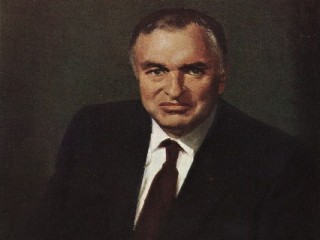
Galo Plaza Lasso biography
Date of birth : 1906-02-17
Date of death : 1987-01-28
Birthplace : New York City, New York, US
Nationality : Ecuadorian
Category : Politics
Last modified : 2011-05-12
Credited as : Statesman, former President of Ecuador,
The Ecuadorian statesman Galo Plaza Lasso was his country's most modern-minded president, and he distinguished himself in the service of international organizations.
Galo Plaza Lasso was born on February 17, 1906, in New York, when his father, Gen. Leonidas Plaza Gutierrez, a former president of Ecuador, was on his way to serve as Ecuadorian minister in Washington. Within a few years the family returned to Ecuador, where the elder Plaza came to occupy the presidency a second time (1912-1916). After completing his primary and secondary education in Quito, young Plaza went back to the United States and attended the universities of California (Berkeley) and of Maryland and Georgetown University.
Back in Ecuador in 1932, Plaza introduced modern techniques in the administration of the family estate, particularly in dairy farming, and his improvements were widely imitated. Soon he entered politics, helped by a personal background that included his father's role as standard-bearer of the Liberal-Radical party, the family connections of his mother, Doña Avelina Lasso, and a modern outlook which he had acquired during his residence in the United States; all of this combined with a personal charm and unassuming behavior.
In 1937 Plaza was elected councilman of Quito and mayor in 1938. In December of that year President Mosquera appointed him minister of national defense, a post he retained through 1939. In July 1944 President Jose Maria Velasco sent him to Washington as ambassador. As such, he was a member of the Ecuadorian delegation at the Chapultepec and San Francisco conferences, both in 1945. The following year he returned to Ecuador to organize the National Democratic Civic movement, a moderate democratic coalition. Elected senator in 1947, he won the presidential election of 1948.
Plaza's presidential term was marked by internal tranquillity. During his campaign he had proclaimed his dedication to effective democracy, and the nation saw in him the man who would bring its political and material regeneration. Plaza kept his promise, even though there were some who took undue advantage of the democratic tolerance of his administration. On the other hand, favorable international conditions and the well-conceived policies of the government brought prosperity to the country. Exports increased, and in general the economic life of the country was stimulated.
At the end of his term, Plaza could look back on 4 years of a highly successful administration. There were no precedents in Ecuador for such a combination of prosperity, stability, and effective democracy. In addition, Plaza's administration initiated a 12-year period marked by these characteristics. In 1952 he transmitted his presidential powers to his legally elected successor, Velasco—the first time in 28 years that a constitutional president was able to complete his full term.
In 1958 Plaza presided over the meetings of the Special Committee of the Economic Commission for Latin America (CEPAL), which laid the foundations for the Latin American common market. In the same year he headed the successful mission of United Nations observers sent to Lebanon; and in 1960 he presided over the committee charged by the United Nations to deal with the evacuation of Belgian military bases in the Congo.
In the 1960 presidential elections of Ecuador, Plaza was the candidate of the Liberal-Radical party. He was opposed by the Conservative candidate, who had the backing of the outgoing administration, and by charismatic former president Velasco. The latter won. However, the party that had nominated Plaza was a weak electoral force, having been discredited in the past, and 1960 was throughout Latin America a year marked by a high tide of anti-United States feelings, a factor which helped Velasco against Plaza.
From May 1964 to the end of 1965 Plaza served as the personal representative of the secretary general of the United Nations and as mediator in Cyprus, a mission which turned out to be surprisingly successful in the face of extremely serious difficulties.
On February 13, 1968, Plaza was elected secretary general of the Organization of American States (OAS). Thereafter Plaza was able to reorganize the secretariat of the organization so as to render it more efficient, and he gave the OAS the dynamic and straightforward leadership which it had been sadly lacking. After leaving the OAS in 1975, Plaza went back to Ecuador as an elder statesman, helping to mediate his country's internal struggles. He was also active in the Inter-American Dialogue. Plaza died of a heart attack on January 28, 1987 in Ecuador.
















